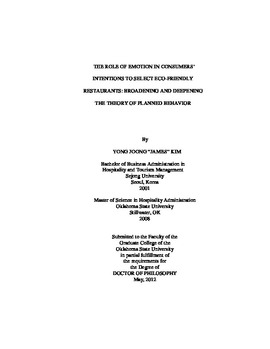| dc.contributor.advisor | Njite, David | |
| dc.contributor.author | Kim, Yong Joong "James" | |
| dc.date.accessioned | 2013-11-26T08:33:22Z | |
| dc.date.available | 2013-11-26T08:33:22Z | |
| dc.date.issued | 2012-05 | |
| dc.identifier.uri | https://hdl.handle.net/11244/7235 | |
| dc.description.abstract | Scope and Method of Study: Restaurants have incorporated eco-friendly business practices into their products and services following the green consumerism trend. Theoretical and empirical investigations regarding the formation of consumers' intentions to select eco-friendly restaurants for a meal have been ongoing. This study proposes and explores the formation of consumers' intentions to select eco-friendly products while proposing that emotion can play a substantial role in this ecological decision-making process. This study contributes to the discipline by (1) providing a better understanding of how to predict consumers' ecological behavior based on an understanding of consumers' choice of eco-friendly restaurants; (2) extending the Theory of Planned Behavior (TPB) literature within the environmental context; and (3) further validating prior research regarding the influence of emotion in the decision-making process. This study utilized both the experimental design and survey techniques to collect data. | |
| dc.description.abstract | Findings and Conclusions: The results demonstrated that the TPB extended by anticipated regret had a significant predictive power, indicating its applicability to the domain of consumers' environmentally conscious decision-making. In addition, this study revealed that emotional state could act as a moderator of relationships within attitude models such as the TPB. The findings have implications for interventions to foster ecological behavior in the restaurant domain while supporting the notion that both types of emotions--namely, anticipated emotion and emotional state--are essential to decision making. Finally, this study confirmed that incorporating emotion in decision-making models could significantly increase their explanatory power. The findings provide further insights into consumers' decision-making processes that are essential for the development of green marketing strategies in the restaurant context. | |
| dc.format | application/pdf | |
| dc.language | en_US | |
| dc.rights | Copyright is held by the author who has granted the Oklahoma State University Library the non-exclusive right to share this material in its institutional repository. Contact Digital Library Services at lib-dls@okstate.edu or 405-744-9161 for the permission policy on the use, reproduction or distribution of this material. | |
| dc.title | Role of emotion in consumers' intentions to select eco-friendly restaurants: Broadening and deepening the theory of planned behavior | |
| dc.contributor.committeeMember | Hancer, Murat | |
| dc.contributor.committeeMember | Slevitch, Elisaveta Lisa | |
| dc.contributor.committeeMember | Brown, Tom J. | |
| osu.filename | Kim_okstate_0664D_12133.pdf | |
| osu.accesstype | Open Access | |
| dc.type.genre | Dissertation | |
| dc.type.material | Text | |
| dc.subject.keywords | eco-friendly restaurant | |
| dc.subject.keywords | ecological behavioral intention | |
| dc.subject.keywords | emotion | |
| dc.subject.keywords | green marketing | |
| dc.subject.keywords | theory of planned behavior | |
| thesis.degree.discipline | Human Environmental Sciences | |
| thesis.degree.grantor | Oklahoma State University | |
